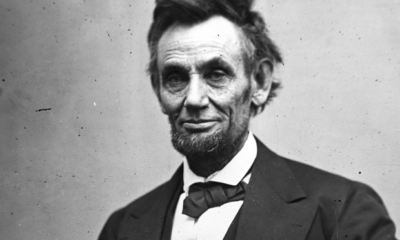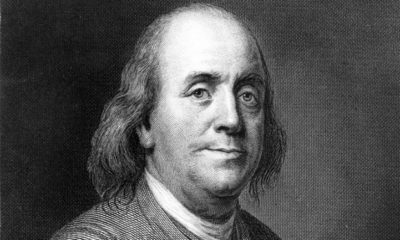Entrepreneurs
The Many Faces of Benjamin Franklin: A Masterclass in Versatile Leadership
Versatile leadership involves the ability to adapt communication as per the needs of others.

Versatile leadership involves the ability to adapt communication as per the needs of others. It is different from situational leadership where the leaders have to adopt the strategies as per the situation.
In versatile leadership, the leaders have to demonstrate the skills and abilities by suiting to various kinds of people and situations. It requires lot of flexibility, maturity and emotional intelligence on the part of the leaders to balance various kinds and aspects of people.
It is also about having expertise and experience in multiple areas.
Leadership is about managing complexities and diversities. At times leaders lose some to gain some.
However versatile leadership helps in eating the cake and having it too. It balances and manages diversified people with diversified opinions and views thus keeping the flock together.
In this context, let us look at Benjamin Franklin who displayed his versatile leadership by venturing into various facets of life in his lifetime.
A Versatile Leader
Benjamin Franklin was one of the rarest Americans.
He will be remembered forever in the history of mankind for his unique and unparalleled incarnations as a printer, publisher, postmaster, philosopher, author, inventor, entrepreneur, intellectual, statesman, and humorist.
He was also the rarest of the rare American leaders who wrote a lot to enlighten the world and who did a lot to write about him.
Ben was a multifaceted personality with in-depth knowledge in several domains. He excelled in various areas and aspects and evolved as a versatile leader. Versatility was his personality.
He preferred the road less traveled. He was a rag to riches story that also epitomizes an inspirational leader. He created a group—Junto that emphasized on self-improvement. He was the brainchild for self-improvement books.
His writings influenced Andrew Carnegie and Dale Carnegie. He laid the foundation for human development and progress. He opined that everyone deserved success irrespective of their poor parental lineage.
Ben’s incarnations
Ben was self-educated and learnt through voracious reading. He learnt the tricks of the printing trade from his brother, James. He deserted the press due to the differences with his brother and worked as a typesetter in London.
After returning to Philadelphia he worked as a shopkeeper and bookkeeper. He donned the role of publisher of a newspaper called The Pennsylvania Gazette. He proved as an author with the publication of Poor Richard’s Almanack.
Let us briefly profile few of his incarnations as an inventor, entrepreneur, intellectual and statesman.
Inventor: He had passion for inventions. He indirectly championed for the cause of industrial revolution through his scientific inventions. He invented lightning rod, bifocal glasses and Franklin stove to name a few. He was liberal to share his inventions with others as he did not patent.
Entrepreneur: He had business acumen and risk taking ability. He set up his own print shop and first franchisee system. He competed and collaborated with his competitors as a business strategy. He converted business threats into opportunities and came out profitably in his business endeavors.
Intellectual: Ben diversified his reading into diversified domains such as politics, history and science that widened his mental horizons. He is an example to the present day youth that anyone can start the journey towards success anywhere at any age and stage of life. It is the bad tradesman who blames his tools. Ben did not blame his poor parental background. He proved to the world that anything and everything is possible through passion, perseverance and persistence.
Statesman: Ben proved his statesmanship through his diplomatic skills with an emphasis on win-win approach. He was an effective negotiator and net worker. He was a successful diplomat who promoted better relations between France and America. He was a statesman par excellence.
Thirteen virtues: Ben was a practical man. He practiced what he preached. He practiced thirteen virtues by following one virtue for a week. The thirteen virtues necessary for true success are: temperance, silence, order, resolution, frugality, industry, sincerity, justice, moderation, cleanliness, tranquility, chastity, and humility. One of Ben’s friends advised to add humility as the thirteenth virtue as he was proud in his conversations. Subsequently he included humility as the thirteenth virtue and practiced rest of his life.
Extraordinary leader: Ben was an extraordinary leader who gave due credit to others. He empathized with others. America was blessed with a leader like Ben who was instrumental in drafting the constitution and one of the founding fathers of American constitution. He was the most accomplished American during his time.
Benjaminism: He strove for innovation and creativity irrespective of the area he explored. He was the first to include pictures in newspapers. He influenced every aspect and area of human life. All human beings use his inventions and follow preaching either directly or indirectly. There is an element of Benjaminism in every human being in this world.
American legend: It is difficult to replicate his charisma in the current context. However, the present leaders can learn several lessons from this American legend. Ben’s ideas and ideals and values and virtues are relevant to the humankind. He demonstrated to the world that an individual can do anything and everything in a lifetime.
Ben was an extraordinary leader, inspirational leader, innovative leader, visionary leader, strategic leader, servant leader, passionate leader and above all a lasting leader. He left his footprints in the history of mankind through his versatile leadership.
Business
Why Smart Entrepreneurs Are Quietly Buying Gold and Silver
When stocks, property, and cash move together, smart business owners turn to one asset that plays by different rules.

You’ve built your business from the ground up. You know what it takes to create value, manage risk, and grow wealth. But here’s something that might surprise you: some of the most successful entrepreneurs are quietly adding physical gold and silver to their portfolios. (more…)
Business
Why Entrepreneurs Should Care About AI Automation Testing
AI automation testing is quietly becoming the unfair advantage behind faster launches, fewer bugs, and startup growth that doesn’t break under pressure.

Faster than ever, the online world pushes entrepreneurs to build sharper tools while moving at full speed. Launching apps, services, or systems? One thing remains clear: fragile code slows everything down. (more…)
Business
Why Smart FMCG Entrepreneurs Outsource What They Can’t Automate
From label mistakes to premium gift sets, manual co-packing gives growing FMCG brands the speed, precision and flexibility in-house teams can’t match.

In the fast-moving consumer goods industry, success isn’t just about having a great product. It’s about speed, efficiency and knowing when to focus your energy on what truly matters. (more…)
Business
The Simple Security Stack Every Online Business Needs
Most small businesses are exposed online without realising it. This simple protection stack keeps costs low and risks lower.

Running a business online brings speed and reach, but it also brings risk. Data moves fast. Payments travel across borders. Teams log in from homes, cafés, and airports. (more…)
-

 News3 weeks ago
News3 weeks agoBrandon Willington Builds 7-Figure Business by Ignoring Almost Everything
-

 Health & Fitness3 weeks ago
Health & Fitness3 weeks agoWhat Minimalism Actually Means for Your Wellness Choices
-

 Did You Know3 weeks ago
Did You Know3 weeks agoWhy Most Online Courses Fail and How to Fix Them
-

 Business3 weeks ago
Business3 weeks agoIf Your Business Internet Keeps Letting You Down, Read This
-

 Business2 weeks ago
Business2 weeks agoEntrepreneur’s Guide to Pay Stubs: Why Freelancers and Small Business Owners Need a Smart Generator
-

 Business1 week ago
Business1 week agoThe Salary Shift Giving UK Employers An Unexpected Edge
-

 Business1 week ago
Business1 week agoThe Simple Security Stack Every Online Business Needs
-

 Scale Your Business1 week ago
Scale Your Business1 week ago5 Real Ways to Grow Your User Base Fast



























